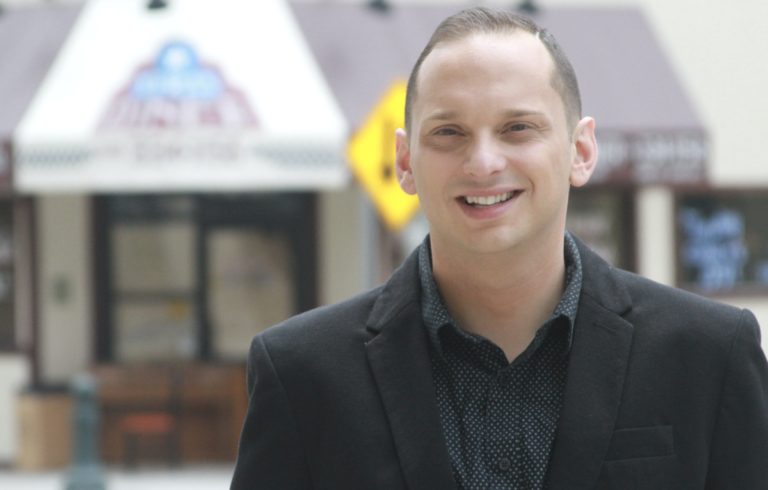What Would a $15-Per-Hour Minimum Wage Mean for the LGBTQ+ Community in Michigan?
A ballot initiative to raise Michigan’s minimum wage could lift many LGBTQ+ people out of poverty

While the stereotype that waiters and bartenders are commonly gay persists, evidence that LGBTQ+ individuals are overrepresented in the restaurant industry is lacking. Still, it stands to reason that LGBTQ+ people in Michigan’s service industry — and all industries — could benefit more than the general population from raising the minimum wage to $15 per hour.
First, more LGBTQ+ people in the U.S. live in poverty than their non-LGBTQ+ counterparts: specifically, 22% versus 16%. Another indicator is the so-called LGBTQ+ wage gap, identified by the Human Rights Campaign (HRC), which reveals LGBTQ+ people earn 90 cents on the dollar compared to non-LGBTQ+ people. Transgender women fare the worst, at 60 cents on the dollar. But while raising hourly wages might sound like a winning strategy, some business owners are sounding the alarm.
Today, activists are collecting signatures to allow voters to decide whether the One Fair Wage ballot initiative becomes law, thus raising the minimum wage in Michigan incrementally to $15 per hour by 2027. Pride Source spoke with two LGBTQ+ individuals involved in the matter: one leading the charge, one advising caution.
The Organizer: “There's so many different things that intersect when it comes to wages.”

If a ballot initiative to raise the minimum wage in Michigan sounds familiar, that may be because petitions to do just that were circulating before the 2018 election. Although the initiative was popular, its supporters’ efforts were thwarted by Republican lawmakers.
“When we did a ballot initiative to raise the minimum wage to $12 an hour while ending the sub-minimum wage as well, it was adopted and amended by the state Legislature,” explained One Fair Wage Lead Organizer Chantel Watkins. “Before it landed on the governor's desk after the election, [they] gutted it.” Subsequently, the Michigan Supreme Court refused to hear a case on the “adopt and amend” maneuver.
One Fair Wage is focused on the service sector, the restaurant industry in particular. Currently, the tipped minimum wage in Michigan is $3.75 per hour, while the standard minimum wage for adults is $9.87 per hour. Those numbers represent increases since Jan. 1, 2022. While the federal minimum is $7.25, efforts are under way to increase it to $15 across the board via the Raise the Wage Act.
Watkins suggested that when raising wages is on the ballot, voters are eager to turn out at the polls — and statistics bear that out. In response to a survey conducted by One Fair Wage, 41% of voters said they would be “more excited” to vote in 2022 if raising the minimum wage were on the ballot, compared with 5% who would be less likely to vote. It’s also to their advantage that any changes made by the Legislature are subject to the governor’s approval.
Watkins sounded confident that this time, One Fair Wage will be a winner, despite the pushback from business owners in the past who feared raising wages would be unsustainable.
“With the way that inflation is going, these people who have fought against this before know that industries will crumble — especially the restaurant industry — if they do not make changes,” Watkins said.
Acknowledging restaurant owners’ fears, Watkins offered a remedy in the form of High Road Kitchens and High Road Restaurants. Emerging from the crisis of the COVID-19 pandemic, this movement supports restaurant owners in advocating for sustainable business models that champion living wages, basic benefits and fair promotion policies. Within the local LGBTQ+ community, the Detroit lesbian-owned bakery Good Cakes and Bakes is one business that implements such practices.
“One restaurant owner has raised everything at his place 50 cents and no one has noticed; some people have now a service fee,” Watkins said. “But that's why we're trying to implement policy. Because if you make $15 an hour the standard across the board, then everybody is going to have to make those changes so that those restaurants will not crumble.”
As the system exists today, Watkins believes LGBTQ+ people and other marginalized groups are more negatively impacted than the general population — and therefore stand to gain the most from the increase in pay.
“I've heard from a lot of different LGBTQ+ people who have withstood the abuse,” Watkins said, “who have worked at host stands and have been called the f-word or a ‘tranny’ or just horrible names, and have just gone their way with a smile in order to stay in that place because they're making a higher wage than if they quit.” She also mentioned nonbinary people who work in the back of the house and are purposely misgendered. Watkins was referring to waged restaurant positions that might start a few dollars above standard minimum wage.
That kind of abuse exists in the tipped minimum wage realm as well, where 90% of women in the U.S. restaurant industry report being subject to unwanted sexual advances at work. Watkins referenced "maskual harassment,"
a twist on sexual harassment in which a server — usually female-presenting — is asked by the customer to remove their face mask. Sexual harassment in the restaurant industry is more common in states with a lower tipped minimum and appears more common at downscale restaurants where women servers outnumber men compared to high-end establishments. Female servers in states that have replaced the tipped minimum wage with a standard minimum wage report sexual harassment less often.
Given the choice, Watkins would eliminate tipping as it presently exists in the service industry. Tipping emerged from the days of slavery, she said. After the Civil War, former slaves weren’t paid a wage, they received tips for being a “good boy” or a “good girl.” In the service industry, it shouldn’t be necessary to “earn” a tip in order to live, believes Watkins.
“If you're a maitre d’ or a concierge, you make a livable wage, and then they put a tip on top of that if they appreciated your service,” Watkins said. “But people should not be dependent on withstanding abuse and harassment in order to make a living.”
Having worked in restaurants and spas herself, Watkins speaks from personal experience.
“I'm a Black, bisexual woman,” Watkins said. “There's so many different things that intersect when it comes to wages, no matter what group you belong to: whether your ethnicity, your race, your sexual orientation, your gender identity, your religious affiliation, or what party you belong to, every single person has, in life, at some point, come in contact with a waged worker or has been one."
“It's something that all of us should care about,” she continued, “especially when you belong to more of the marginalized groups [because] you are facing more abuses than anyone else. It is very, very important that I not only stick up for other people, but I'm sticking up for myself.”
The Bar Owner: “That’s not how economics work.”

Brett Nicholson has done the math. And the openly gay owner of Pontiac’s storied Liberty Bar can’t find the extra $66,000 that would be needed annually if he’s required to pay his bartenders and servers $15 per hour. That’s not to say his business isn’t successful — quite the opposite.
“I don't have the final numbers from everyone,” Nicholson said, “but I would believe that probably Liberty Bar is the most successful restaurant in downtown Pontiac — and this is 91 years in business. 2021 was our best year because we worked very, very hard. All our entire team, our entire staff.” Because of that, he said, he was able to raise the kitchen staff’s wages to $16 per hour. But Nicholson doesn’t think $15 per hour is feasible for his servers and bartenders who currently make $3.75 plus tips.
“I completely believe in, and understand, the average worker and getting their dollar amount up to 15 so that it is a living wage, so they can support their family,” Nicholson said. “That's not what we're talking about with tipped minimum wage.”
The workers who take home tips on top of the minimum wage do well above average at Liberty Bar, compared with others in the restaurant industry: from the low $20s per hour, including tips, all the way up to $42 per hour for Nicholson’s top bartender. According to U.S. Bureau of Labor Statistics data, the median hourly wage for a restaurant server is $11.42, while the median for a bartender is $12. Popularity of restaurant, generosity of customer, location and other variables determine what often represents a significant chunk of a tipped worker’s income.
Nicholson doesn’t believe there’s anything problematic with the necessity to earn tips in order to make a living wage: that’s the nature of the “service” industry. “People will continue to sexualize each other, people [will] continue to treat service employees inappropriately because they're in service to someone,” he said. But while Nicholson said inappropriate behavior by customers happens at places like Hooters, none of his employees have reported foul play where he works.
“In any industry, someone has choices on who they work for and whether or not they're being treated properly,” Nicholson said. “Especially in salons [and the] restaurant industry, there's a tremendous amount of these organizations. You move from one place to the next because it's not the right fit for you. It's a wide industry. You have so many different types of settings.”
But while Nicholson believes workers have options, he doesn’t think he has the option of simply raising prices to make up the estimated $66,000 per year shortfall. If required by law to pay his entire staff at least $15 per hour, he would be forced to up his prices significantly — and he doesn’t believe Liberty Bar is suited to be a High Roads success story. He also thinks his high earners might seek opportunities elsewhere.
“They have this idea that everyone's just gonna start making a ton more money and spend a lot more money, and then it'll all even out,” Nicholson said. “But that's not how economics work. It's never actually happened that way.” And Nicholson doesn’t have confidence the government would step in with subsidies if the experiment failed, as a proponent of the initiative suggested to him.
Yet Nicholson isn’t just concerned about dollars and cents. As the caretaker of a landmark in metro Detroit’s LGBTQ+ community, he’s troubled by what the loss of Liberty Bar would represent. Nicholson distinguished two types of gay bars. In one category are bars in which the “average” LGBTQ+ person would feel comfortable, but that also welcome the wider community. Then there are bars like the Liberty.
“There are many nights where we have many men who have come in dressed as their true self for the first time, and they're nervous,” Nicholson said. “They're scared to come and they park in the back…they're at the end of the bar, and you can see them shaking like a leaf. And it is our job to go over, [to] welcome them, to be affirming, to make sure that they know that they're in the right place and that they're going to be safe.”
The initiative is based on speculation, says Nicholson, and he doesn’t want to speculate on the safe spaces for the LGBTQ+ community. “There is a group of people who need us,” Nicholson said, and it’s been their choice not to make the Liberty an open format establishment. Nicholson credits the success of his business with his employees’ hard work.
“I'm saying if we can do it, and if we can get our bartenders in a beleaguered auto town in a downtown to make — in the lowest sense — more than $23 an hour, any other bar can do it too,” Nicholson said. “They have to put in the work. They have to put in the equity.” Nicholson mentioned repainting and adding a patio.
“Restaurants, salons and services go out of business all the time because they cannot attract staff when they are not offering the earning potential,” he added. “Leave those of us alone that are."









